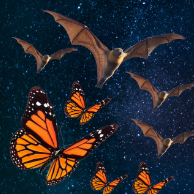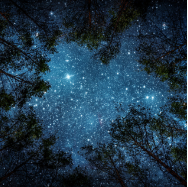A Lighting Guy Hoping for Darkness
I am sitting at my desk, but my mind wonders, far away and into the future.
In my vision, I can see myself sitting on the grass in my garden, with my children lying next to me. The sky is pitch black and the light of the stars pierces the darkness. They look like a giant diamond shattered into a billion pieces.
I can hear the sweet innocent voice of my children murmuring “Twinkle, twinkle little star, how I wonder what you are…”
My vision stops there, and reality brings me back to what… I wonder the most… I wonder if this vision will ever come true if I can help the world maintain the darkness of our sky and the visibility of the stars.
“Dark sky? But Chris, you are in the lighting industry, what are you talking about?”
Allow me to share more about the dark skies, their significance, and the crucial role we can all play in this movement.
Dark Sky is an international movement focusing on combating the detrimental effects of light pollution on wildlife.
The Effects on Wildlife
In our urbanised world, artificial light has brightened the night, affecting the natural habitats of millions of species and, consequently, putting our future at risk.

Imagine living a life where your grandchildren may never experience the magic of seeing a firefly for the first time, or the majestic beauty of a monarch butterfly. These two insects are among the “Top five threatened species” due to light pollution.

The classic lullaby “Twinkle, Twinkle Little Star”, we all once heard; says:
Then the traveller in the dark. Thanks you for your tiny spark, How could he see where to go, If you did not twinkle so?
We grew up listening to these lyrics, however, somewhere along the way, we forgot about the birds, insects and bats, travellers of the night, and their need to guide themselves only by the brightness of the moon and stars.
For example, insects use the moon as a signpost to navigate in the night. A bright light will disorientate them, and we have all seen this hundreds of times when insects circle back around a bulb in the night. This is a small glimpse into the impacts of a disrupted ecosystem. Birds and bats are affected, as they can’t feed on these insects.
Animals such as bats only go out at night to find food, a bright light close to their roosts can make them stay in longer, reducing the amount of time to feed, or it might even make them not go out at all. This usually leads to malnutrition and death, putting the bats at risk of extinction.
Bats play a vital part in our native wildlife, and they are a key indicator of the state of the environment. They are top predators of common nocturnal insects and are sensitive to changes in land use practices. In a world without bats, we would have no forests or farms, as bats help spread seeds and control the insect population.
Aside from the negative effects on wildlife, light pollution also robs us of the beauty of the night sky and the millions of stars it holds.
Playing Our Part
We all have to play our part in reducing light pollution, and while we can’t control the full urban environment, we can control the way our houses and gardens are illuminated.
The good news is that there are ways to protect the dark skies, and as a guy working in the lighting industry, passionate about sustainability and protecting nature, I can teach you everything you need to know about these methods.
Maintaining a dark sky above your garden doesn't mean turning the lights off completely. It means choosing the right lighting systems and always considering living in harmony with nature as a norm.Thank you for reading this story and for learning more about the dark sky movement, in my next blog article I will explain how to create a dark skies-friendly lighting scheme.
If you are eager to learn more now, please watch my video series on this matter HERE
